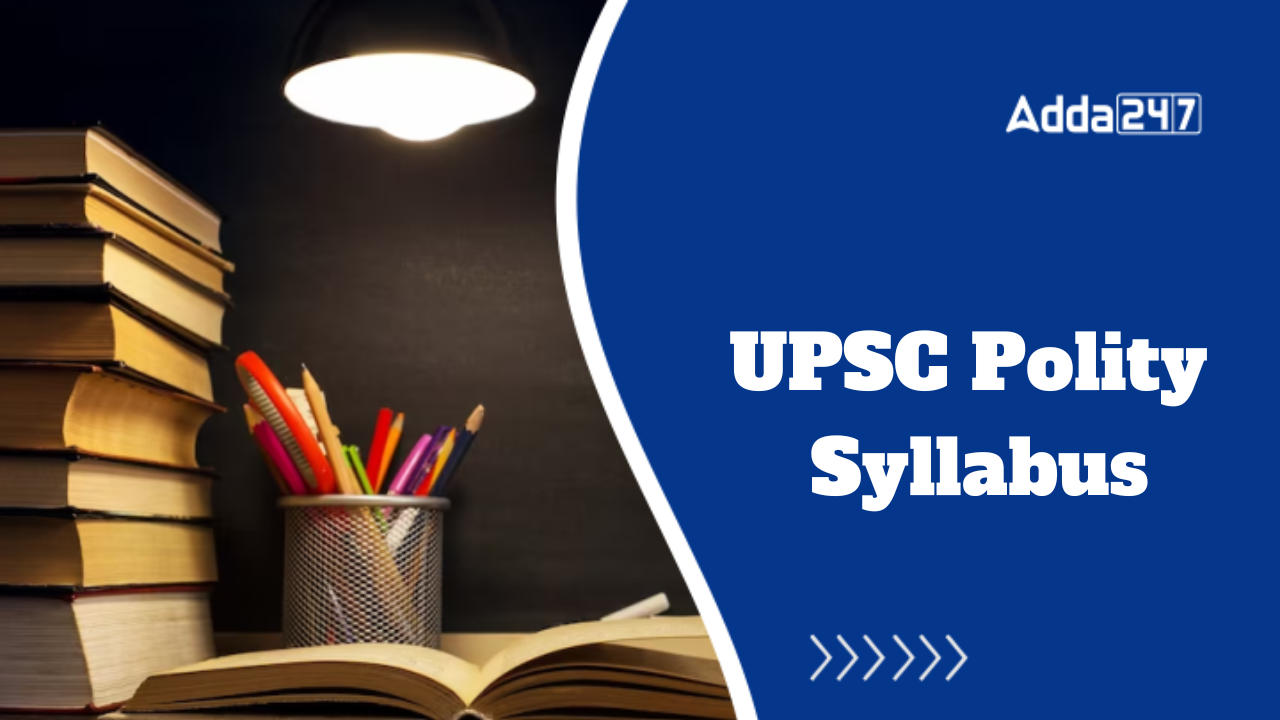Table of Contents
UPSC allows candidates to choose from 48 optional subjects for the mains examination. One of these is Polity and International Relations, which includes topics such as India’s freedom struggle, political landscape, the Constitution of India, international economic systems and trade, and international organizations. Polity is considered one of the top 10 most challenging subjects in the UPSC exam.
Many students choose Polity and International Relations as their optional subjects in the UPSC exam due to its scoring potential. It is observed in the previous years that candidates with polity optional score very well.
The UPSC PSIR syllabus includes two papers, Optional Paper I and Paper II, as part of the mains stage, which consists of a total of 9 papers. Below is a detailed discussion of the Political Science and International Relations syllabus for the Mains exam.
UPSC Polity Syllabus 2024
Choosing Polity as an optional subject for the UPSC Mains exam is ideal for candidates with strong skills and a passion for this field. This subject covers topics such as India’s freedom struggle, political landscape, the Constitution of India, international economic systems and trade, international organizations, and India’s foreign policy. Numerous books are available in the market to help students prepare for the UPSC Polity optional subject.
The Polity subject consists of two papers, each worth 250 marks, a total of 500 marks. Each paper is divided into two sections, with a total of 8 questions asked in the exam. Students must answer five out of the eight given questions, including one compulsory question from the last three. Excelling in the polity optional exam can significantly enhance an IAS aspirant’s overall score in the UPSC Mains.
| Aspect | Details |
| Total Papers | 2 Papers |
| Marks per Paper | 250 Marks |
| Total Marks | 500 Marks |
| Impact on Overall Score |
A strong performance in PSIR can significantly boost the overall score in the UPSC Mains exam
|
UPSC Polity syllabus 2024 for Mains exam
Aspirants are required to study the Indian polity syllabus for UPSC Mains in General Studies Paper 2. This paper carries 250 marks, and many topics covered in the UPSC Mains Syllabus on Polity overlap with those topics which are already being asked in the Prelims GS-2 paper. Below, candidates can find a comprehensive polity Syllabus for UPSC Mains.
UPSC Polity Syllabus for Optional Paper I
Candidates can check out the Topic-wise UPSC Polity Syllabus for Mains Optional paper 1.
Political Theory and Indian Politics:
- Political theory: meaning and approaches.
- Theories of the state: Liberal, Neo-liberal, Marxist, Pluralist, Post-colonial and feminist.
- Justice: Conceptions of justice with special reference to Rawl’s theory of justice and its communitarian critiques.
- Equality: Social, political, and economic; the relationship between equality and freedom; Affirmative action.
- Rights: Meaning and theories; different kinds of rights; concept of Human Rights.
- Democracy: Classical and contemporary theories; different models of democracy-representative, participatory, and deliberative.
- Concept of power: hegemony, ideology, and legitimacy.
- Political Ideologies: Liberalism, Socialism, Marxism, Fascism, Gandhism, and Feminism.
- Indian Political Thought: Dharamshastra, Arthashastra, and Buddhist traditions; Sir Syed Ahmed Khan, Sri Aurobindo, M.K. Gandhi, B.R. Ambedkar, M.N. Roy.
- Western Political Thought: Plato, Aristotle, Machiavelli, Hobbes, Locke, John S. Mill, Marx, Gramsci, Hannah Arendt.
Indian Government and Politics
- Indian Nationalism:
a) Political Strategies of India’s Freedom struggle: constitutionalism to mass Satyagraha, Non-cooperation, Civil Disobedience; militant and revolutionary movements, Peasant and workers’ movements.
b) Perspectives on the Indian National Movement: Liberal, Socialist, and Marxist; Radical humanist and Dalit. - Making of the Indian Constitution: Legacies of the British rule; different social and political perspectives.
- Salient Features of the Indian Constitution: The Preamble, Fundamental Rights and Duties, Directive Principles; Parliamentary System and Amendment Procedures; Judicial Review and Basic Structure doctrine.
- a. Principal Organs of the Union Government: Envisaged role and actual working of the Executive, Legislature, and Supreme Court.
b. Principal Organs of the State Government: Envisaged role and actual working of the Executive, Legislature, and High Courts. - Grassroots Democracy: Panchayati Raj and Municipal Government; significance of 73rd and 74th Amendments; Grassroot movements.
- Statutory Inst I tut ions/Commissions: Election Commission, Comptroller, and Auditor General, Finance Commission, Union Public Service Commission, National Commission for Scheduled Castes, National Commission for Scheduled Tribes, National Commission for Women; National Human Rights Commission, National Commission for Minorities, National Backward Classes Commission.
- Federalism: Constitutional provisions; changing nature of center-state relations; integrationist tendencies and regional aspirations; inter-state disputes.
- Planning and Economic Development: Nehruvian and Gandhian perspectives; the role of planning and public sector; Green Revolution, land reforms and agrarian relations; liberalization and economic reforms.
- Caste, Religion, and Ethnicity in Indian Politics.
- Party System: National and regional political parties, ideological and social bases of parties; patterns of coalition politics; Pressure groups, trends in electoral behaviour; changing socio-economic profile of Legislators.
- Social Movements: Civil liberties and human rights movements; women’s movements; environmentalist movements
UPSC Polity Science Syllabus for Optional Paper II
Candidates can check out the Topic-wise UPSC PSIR syllabus for Mains optional paper II.
A) Comparative Political Analysis and International Politics
- Comparative Politics: Nature and major approaches; political economy and political sociology perspectives; limitations of the comparative method.
- State in comparative perspective: Characteristics and changing nature of the State in capitalist and socialist economies, and, advanced industrial and developing societies.
- Politics of Representation and Participation: Political parties, pressure groups, and social movements in advanced industrial and developing societies.
- Globalization: Responses from developed and developing societies.
- Approaches to the Study of International Relations: Idealist, Realist, Marxist, Functionalist and Systems theory.
- Key concepts in International Relations: National interest, Security and power; Balance of power and deterrence; Transnational actors and collective security; World capitalist economy and globalization.
- Changing International Political Order:
(a) Rise of super powers; strategic and ideological Bipolarity, arms race and Cold War; nuclear threat;
(b) Non-aligned movement: Aims and achievements;
(c) Collapse of the Soviet Union; Unipolarity and American hegemony; relevance of non-alignment in the contemporary world. - Evolution of the International Economic System: From Brettonwoods to WTO; Socialist economies and the CMEA (Council for Mutual Economic Assistance); Third World demand for new international economic order; Globalisation of the world economy.
- United Nations: Envisaged role and actual record; specialized UN agencies-aims and functioning; need for UN reforms.
- Regionalization of World Politics: EU, ASEAN, APEC, SAARC, NAFTA.
- Contemporary Global Concerns: Democracy, human rights, environment, gender justice, terrorism, nuclear proliferation.
B) India and the World
- Indian Foreign Policy: Determinants of foreign policy; institutions of policy-making; continuity and change.
- India’s Contribution to the Non-Alignment Movement: Different phases; current role.
- India and South Asia:
(a) Regional Co-operation: SAARC-past performance and prospects.
(b) South Asia as a Free Trade Area.
(c) India’s “Look East” policy and “Act East” policy
(d) Challenge to regional co-operation: river water disputes; illegal cross-border migration; ethnic conflicts and insurgencies; border disputes. - India and the Global South: Relations with Africa and Latin America; leadership role in the demand for NIEO and WTO negotiations.
- India and the Global Centres of Power: USA, EU, Japan, China, and Russia.
- India and the UN System: Role in UN Peace-keeping; Demand for Permanent Seat in the UN Security Council and working and functions at UN.
- India and the Nuclear Question: Changing perceptions and policy.
- Recent developments in Indian Foreign policy: India’s position on the recent crisis in Afghanistan, Iraq, and West Asia, growing relations with the US and Israel; a vision of a new world order.
UPSC Polity Syllabus 2024 PDF
Candidates who are appearing in the UPSC Polity mains Exam can download the UPSC Polity Syllabus PDF Here. Click on the link below to Download the UPSC Polity Syllabus 2024.
Download UPSC Political Science Syllabus 2024 PDF
UPSC Polity Syllabus Preparation Tips
Here, are some of the preparation resources added to you like using books and newspapers. use online resources through different web portals and platforms. Solve UPSC previous year’s questions to build a strong understanding of these topics.
- Read NCERT Books
- Analyze Previous Years’ Papers
- Create a Study Plan
- Current Affairs
- Focus on Key Concepts
- Practice Answer Writing
Remember, consistency, discipline, and a thorough understanding of concepts are essential for success in the UPSC Mains Polity examination.
Good luck with your preparation!


 TSPSC Group 1 Question Paper 2024, Downl...
TSPSC Group 1 Question Paper 2024, Downl...
 TSPSC Group 1 Answer key 2024 Out, Downl...
TSPSC Group 1 Answer key 2024 Out, Downl...
 Cabinet Ministers of India 2024, New Cab...
Cabinet Ministers of India 2024, New Cab...







